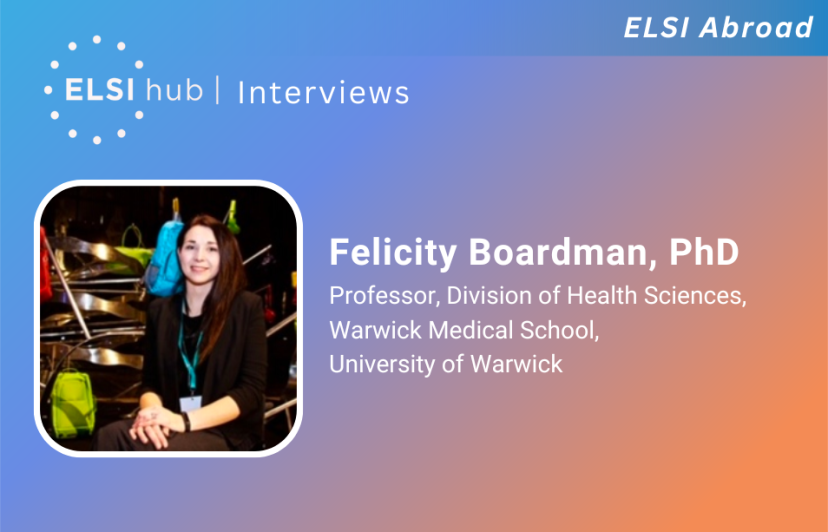
ELSI Abroad: Spotlight on the United Kingdom
CERA is pleased to share a set of interviews that aim to foster a global perspective on the ELSI field of study and inspire information sharing and collaboration across national borders. In this second installment of our series, we are speaking with Felicity Boardman, Ph.D. about ELSI research in the United Kingdom. Prof. Boardman is a professor at Warwick Medical School at the University of Warwick and lead researcher, with Dr. Corinna Clark, of the SERG network (Social and Ethical Research in Genomics). SERG is funded by the Wellcome Trust to promote a positive research culture for social and ethical research in genomics and offer a forum where research data, findings, and ideas can be shared. She conducts research on the social and ethical implications of reproductive genetics, supervises doctoral and research students, and teaches several courses and workshops including Mixed Methods for Health Research. Prof. Boardman is also Deputy Editor of the Journal of Genetic Counseling and Section Editor of the European Journal of Human Genetics.
CERA: What inspired you to focus your work on the ethical, legal, and social implications of genetics and genomics?
Prof. Boardman: As a researcher with a genetic disability myself, I became interested in genetics at quite a young age, specifically, how understandings of genetics are both born out of, and become overlayed with, inherently social interpretations around identity, belonging, risk, uncertainty, and harm.
CERA: What can you tell us about ELSI research in the United Kingdom?
Prof. Boardman: ELSI work is gaining increased attention in the UK now with the launch of the Generation Study, a national study led by Genomics England that will sequence the genomes of 100,000 newborn babies to inform future decisions on using whole genome sequencing to support newborn screening. As this initiative will be using whole genome sequencing as a screening tool, there will be lots of interesting ELSI work going on around this. Also, last year, the Nuffield Council on Bioethics published a report on standards of ethics research in the area of genomics. The report detailed the range of topics and methods used by ethics researchers in the UK and concluded that ethics research and scholarship need to be better embedded within healthcare systems and conducted with the inclusion of relevant stakeholders. I think it’s important that the stakeholder group also includes law and social science. Genomics is a rapidly changing field, and we need to ensure that a diversity of perspectives are brought to bear on its future.
CERA: What would you say is the most important ELSI issue in the UK right now? Why do you think so?
Prof. Boardman: I think the use of genomic technologies for population screening is on the top of many agendas now in the UK. There are a whole raft of ELSI considerations surrounding this use of genomic technologies and there is lack of clarity, currently, around what we, as a society, want from the mass of data that can be produced. There is a bit of a mismatch between the ways that screening programmes are typically evaluated in the UK (i.e., according to Wilson and Jungner criteria and on a condition-by-condition basis) and the kinds of evaluation that would be needed for such high throughput technologies. To address this, consensus would need to be reached regarding how treatment, actionability, and benefit are defined in genomic contexts, as well as how uncertain results are understood and dealt with.
CERA: What ELSI issues do you see that would benefit from multi-country deliberation by ELSI scholars?
Prof. Boardman: Recently, I met with a team of scholars from across the world in Switzerland to host a Brocher workshop that focused on the concept of ‘severity’ in genomic medicine. This concept is used as a gate keeper in genomics, determining access to technologies and gene therapies, however there is little consensus on what it means and how it should be evaluated. We are working on the outputs of this workshop currently, but it is a topic that really benefits from input from a wide range of stakeholders and scholars from across the world. It would be great to keep the conversation we had on this going!
CERA: What works of ELSI scholarship from the UK would you recommend to the global ELSI community?
Prof. Boardman: The work that Bobbie Farsides and Anneke Lucassen have done on ‘ethical preparedness’ is wonderful, the Prenatal Assessment of Genome and Exomes (PAGE) study has produced some fascinating insights, and Anna Middleton’s team at the Sanger Institute do great work around public understandings of genomics, including a recent citizen’s jury on genome editing. Cathy Herbrand is doing some great work on pre-conception carrier screening at De Montfort University (DMU) and the late Nina Hallowell’s work is always incredible. There is a lot of great work coming out of the UK at the moment.
CERA: Can you think of any online seminars, scholarly resources, or anything else that you would like us to share with the broader ELSI research community?
Prof. Boardman: I would encourage you to join the SERG network (Social and Ethical Research in Genomics)! We are a group of researchers, patients, stakeholders, and other interested parties who meet virtually 3-4 time a year to share works in progress, research barriers and opportunities we might be experiencing, and pieces of analysis that we want feedback on, all in the context of a friendly and mutually supportive environment. We are UK based, but our data sharing workshops are attended by people from across the world.
CERA: Is there anything else you would like to say?
Prof. Boardman: One of the things I love about working in the ELSI field is the warm, friendly, insightful, and ever-curious communities that have sprung up around it. ELSI work is only going to become more important over the next decade and the collaborative communities we forge around this work are so important.
If you would like to be interviewed for a future installment of ELSI Abroad, please feel welcome to email us at [email protected]. Please see our other interviews in this series focused on ELSI research in Canada, Australia, and Belgium.


